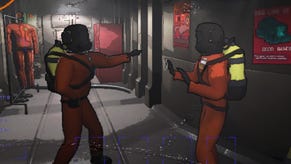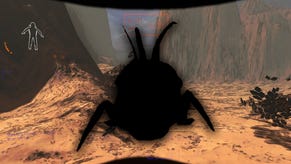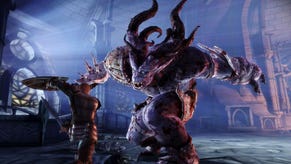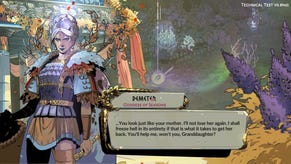The Sunday Papers
Read more
Sundays are for living it large in San Francisco, on your one free day before GDC. Alice Bee tells me there are some good sea lions, but if you don't have any sea lions to see, that's OK. You can still read some of the best writing about videogames from the past week.
On Waypoint, Patrick Klepek spoke to KO_OP, a games company where everyone gets both an equal paycheck and a say in important decisions. I link to a lot of pieces here that explain, correctly and compellingly, what’s wrong with a company or a decision or a culture. I wish I could link to pieces that celebrate progressive company practices more often.
KO_OP is only 10 people, and while each has a distinct role— Dabbous, for example, handles a lot of the day-to-day business decisions, and is often their public spokesperson — they have an equal seat at the table. Every person, for example, has the same salary. If you joined the studio today, you make the same as someone who’s been there since day one. Small decisions are made by individuals, because otherwise nothing would get done, but KO_OP’s big decisions happen as a group.
On Polygon, Kenneth Shepard described the atrocious reactions Overwatch players have to Soldier 76 being gay. It's depressingly common, it seems, for them to freak out at the one spray that depicts him and his ex-boyfriend. I don't know how much space there is for 76's sexuality to express itself inside an actual Overwatch match, but I'd like to see Blizzard get better at explicitly condemning homophobia.
Every time I’ve done that, I felt a pang of shame. I’m using the same “out of sight, out of mind” approach to queerness that lets Blizzard get praise for canonical inclusion without making its characters’ identities a meaningful part of the game. Blizzard knows how to make the game seem welcoming, but it’s unable to create an actual in-game environment that mirrored its aspirations.
I'm as surprised as you are that I'm about to link to a blog post from EA’s Global Consumer Insights team, but Jenny Shi's study into player perceptions of inclusion is an interesting read. For the most part it just confirms the sort of thing you'd expect, but it's always nice to have your thoughts validated by graphs.
While representation has been getting better, our research tells us that players perceive that behavior and toxicity management have not improved much. Many of us who have played an online multiplayer game or mode will know that it’s not uncommon to experience trolling or worse from other players. Our research reveals that three out of five players are concerned with toxicity (in the form of abusive chat, hate speech, sexism, or racism in gaming), and that toxicity is only second to the top concern, which is game quality.
For The New Yorker, Simon Parkin took aim at Ubisoft's claims that the Division 2 is apolitical. Parkin has enough to talk about without going into this, but claiming your game lacks a political message is in itself deeply political - especially when your game is about terrorism.
According to Ubisoft, The Division 2 is about political dissension in much the same way that the Pirates of the Caribbean ride, at Disneyland, is about robbery on the high seas. When one plays the game, which is out on Friday, this claim can seem to break down. The Division 2 opens with a sprint across the South Lawn past insurgent fighters and toward a White House that features charred walls and pocked pillars. You are free to wander inside the Presidential residence, which has been turned into a military base. Then you head out into the surrounding shantytowns, where you find debris, dogs, and homemade banners that read “Where is the aid?” and “Fuck the government.” An assortment of virtual weaponry offers the only conduit through which peace may be restored.
On Kotaku, Cecilia D'Anastasio delved into Gail Gygax's never-ending fight to protect her husband's legacy - her husband being the co-creator of Dungeons and Dragons. That fight seems to be against both wealthy lawyers and possibly imaginary thieves. Those thieves may or not be real, but bad actors and paranoia are both clearly at play.
It was a fall day in 2013, and it had been five years since her husband Gary, the co-creator of Dungeons & Dragons, had died. Since then, Gail had gotten help around the house from a neighbor, Brian Terry. A stocky, 62-year-old bartender, Terry came around to do things that needed doing, like mowing the lawn or helping her pack and ship the antiques she finds around Lake Geneva and sells online. That day, Terry was crossing Gail’s picket-fenced lawn when his feet caught a barely-visible string of fishing line, set a foot above the ground, wrapped several times around two sticks stuck deep in the dirt. Both of them agreed it was a trap.
The attention economy is dead, argues Bijan Stephen for The Verge, partly because of Fortnite. It's so big that Netflix regards Epic as their main competitor. I hadn't thought about Fortnite's update model from quite this perspective before, nor the possibility of its map becoming drenched in advertising. There is a future where that is the norm and by God we must fight it.
“Paying attention” was a phrase before it became a literalization, before canny people realized just how much money time is worth. The advertising industry — and therefore the industries it supports, like the media — is predicated on the idea that if you’ve heard of something and have a positive association with it, you’re more likely to buy the product or the experience. And that isn’t wrong: people make decisions for reasons unfathomable even to themselves all the time. It makes sense to monetize humanity’s fundamental irrationality. (Sucks to the economists who peddled the Rational Consumer model of microeconomic behavior!) But the base assumption that the whole edifice is built on is becoming unstable, because what happens when society’s attention is entirely monopolized?
On Eurogamer, Giada Zavarise expounded the importance of good and numerous videogame translations. I particularly liked this point about the widespread dependence on fan labour, even though it does sit rather oddly next to the plug for Itch's community translation project.
Fan translations of professional releases are a common practice. Fan translators do them out of passion, aiming to share a beloved game with as many people as possible. In some cases, fan translations get the developers' blessing and become officially supported. Sometimes the fans get paid for their efforts; sometimes, they only get the glory.
It's beautiful, this desire to share a game with others. But when developers benefit economically from a fan translation, the line between collaboration and fan exploitation can become extremely thin.
Hamish Black continues his sterling work with Writing on Games, this time writing on almost the exact thoughts I had about Devil May Cry 5.
Music this week is Misty Badger by Elephant Sessions.









